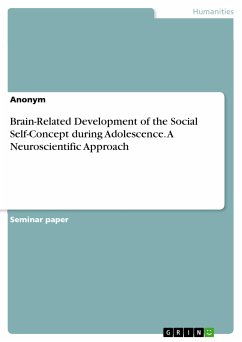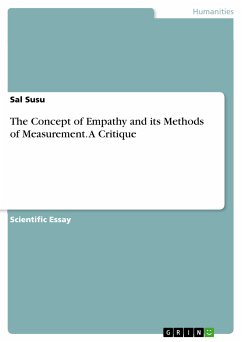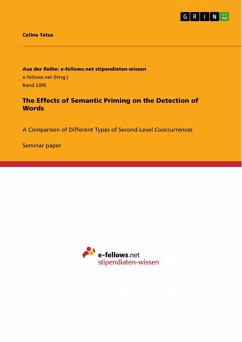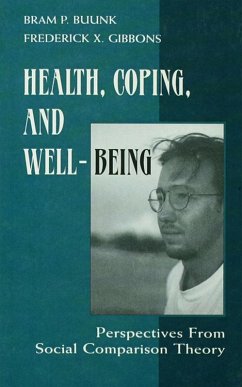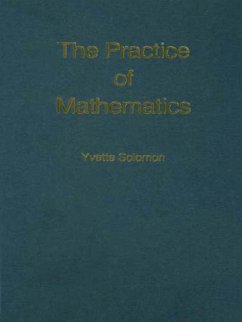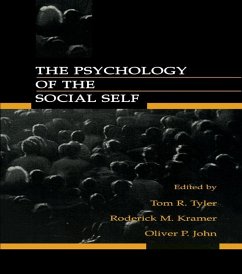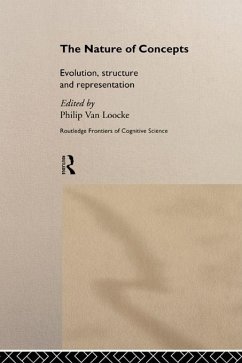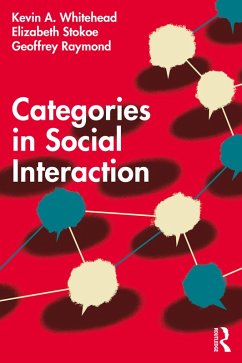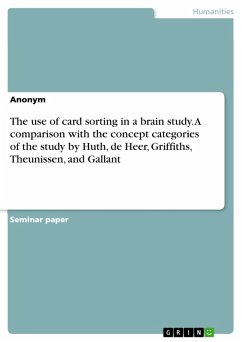
The use of card sorting in a brain study. A comparison with the concept categories of the study by Huth, de Heer, Griffiths, Theunissen, and Gallant (eBook, PDF)
Sofort per Download lieferbar
Statt: 17,95 €**
15,99 €
inkl. MwSt. und vom Verlag festgesetzt.
**Preis der gedruckten Ausgabe (Broschiertes Buch)
Weitere Ausgaben:

PAYBACK Punkte
0 °P sammeln!
Seminar paper from the year 2018 in the subject Psychology - Cognition, grade: 1,0, University of Twente (Behavioural, Management and Social Sciences), language: English, abstract: The current study tested whether humans consciously group words into clusters in the same way as the results of an fMRI study suggest. Doing this, it is referred to the study by Huth, de Heer, Griffiths, Theunissen, and Gallant in which increased brain activity in certain areas was detected while people listened to certain words. Based on these brain areas, the words could be categorized. For the current study 50 of...
Seminar paper from the year 2018 in the subject Psychology - Cognition, grade: 1,0, University of Twente (Behavioural, Management and Social Sciences), language: English, abstract: The current study tested whether humans consciously group words into clusters in the same way as the results of an fMRI study suggest. Doing this, it is referred to the study by Huth, de Heer, Griffiths, Theunissen, and Gallant in which increased brain activity in certain areas was detected while people listened to certain words. Based on these brain areas, the words could be categorized. For the current study 50 of these words were selected and used to perform an open card sorting and a questionnaire. The sample comprised 17 participants. Using a chi-squared test, the relationship between the categorization in the card sorting and in the study was analysed, as was the relationship between the two specific categories violence and time using a parametric test for independent samples. With regard to the analysis of the questionnaire, t-tests were used to compare categories with each other and with filler words. The results of the card sorting revealed a significant relationship between clusters in the card sorting and the categories of the study. In addition, the categories violence and time were found to be significantly different, while increased proximity values occurred within the categories. The questionnaire showed that concepts were more closely related to the categories they originate, compared to filler items, and that concepts within the category time were rated as better fitting than concepts within the category violence. The results of the current study suggest that humans indeed consciously categorise concepts in a similar way as the brain activation implies. Words within those categories are related to each other and clearly distinguishable from words in other categories.
Dieser Download kann aus rechtlichen Gründen nur mit Rechnungsadresse in A, B, BG, CY, CZ, D, DK, EW, E, FIN, F, GR, HR, H, IRL, I, LT, L, LR, M, NL, PL, P, R, S, SLO, SK ausgeliefert werden.





